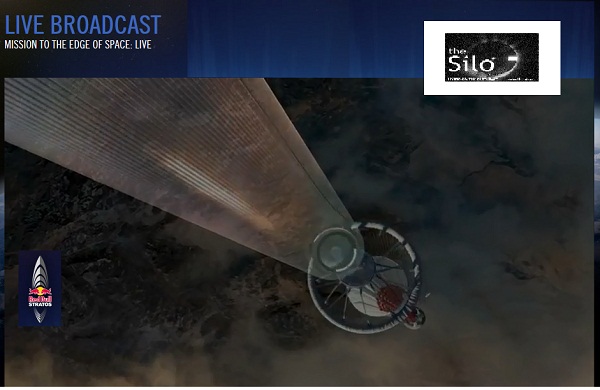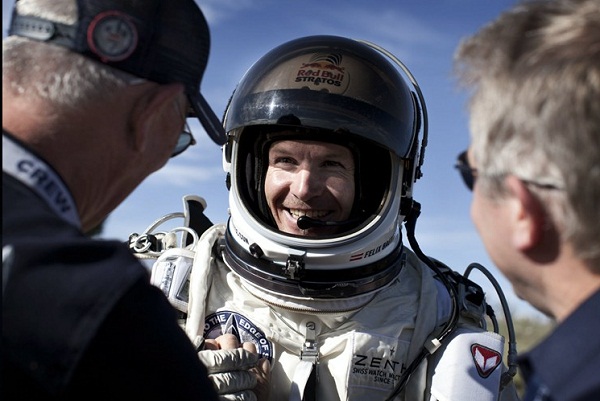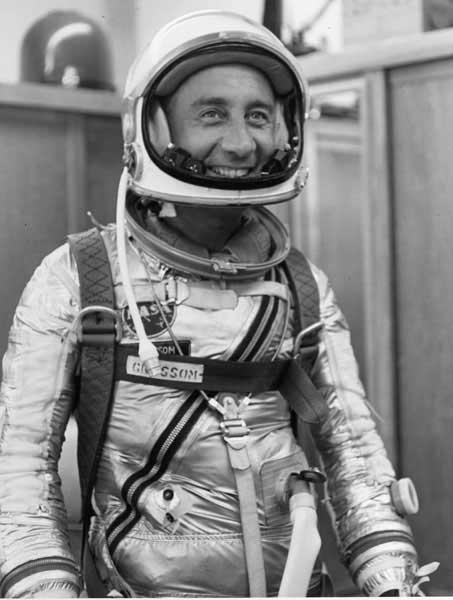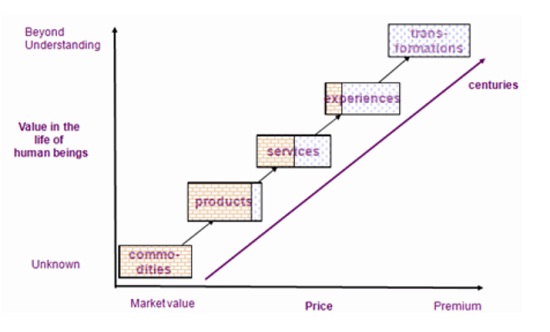
It’s October 5, 2012 and Felix Baumgartner is about to smash the 50+ year old free fall height record and break the sound barrier along the way.
Using a lighter-than-air balloon for the ascent stage, Baumgartner will float above Roswell, New Mexico, USA to the edge of space and then open the door of his pressurized capsule. It will be one small step for a man, and one giant fall for Felix and one giant marketing coup for RedBull.
When I was a fellow at the Canadian Film Centre’s New Media Lab in 2009, I was asked to make three predictions about future ‘real-life’ trends. Near the top of my list was increasingly ‘extreme’ extreme sports. I think I have gotten that one right, and if you’d like to know what the other two were drop me an email. With each leap in technology, mankind has been able to attempt more extreme feats. Technology has allowed us, the viewer, to live directly through real life participants much more vicariously than ever before, and mainstream virtual reality is just around the corner. Like a feedback loop, technology pushes the boundaries of what the human mind can conceive and what the human body can accomplish. Symbiotically, as we achieve more and more incredible feats, technology is utilized to not only showcase these feats but to instill an empowerment. More on this later….
In the early decades of the last century, extreme sports included seemingly placid activities when viewed with today’s sensibilities. Consider these examples: crossing the English Channel by airplane, modifying an automobile with solid rockets to reach a speed of 100 miles per hour, diving into the sea from a height of one hundred feet. In their allotted place in time, these activities were considered to be incredibly extreme and borderline committable.
Technology at that time meant that in order for a viewer to share in the participant’s experience, the viewer needed to read about the event in the newspaper, listen to the event on the radio or visit the event in person. This was a time of great internal imagination as methods and technologies in play were mystical and were not an everyday occurrence in those viewers lives. That being said, the crossing of the English Channel by airplane and other flights of fancy were made possible due to “magical signals traveling through the ether”. Aka: wireless radio technology. A pilot was now able to fly by honing in on radio signals. This same technology was used to broadcast news of the flight and this connectedness via the same technology may not be symbiosis in the traditional ecological sense but is most certainly a form of extreme mutualism. (Spinoza’s Theory of Imagination says essentially the same thing in his Extended Pattern Preservation Doctrine: The persistence of an individual [replace ‘individual’ with ‘same technology’] through time consists not in the sameness of underlying substance but, insofar as it is conceived through extension, in the persistence of a distinctive pattern of communication among moving parts. *
Our era is markedly different.
It is one of internal and external imagination. When Felix Baumgartner rides to the edge of space, we get to ride with him. We can watch a live stream of his progress, observe his ‘vital stats’: real-time mission statistics by watching the graphics on our smart device. We can hear the banter between mission control and Felix. We are in effect Felix Baumgartner’s mute passenger. (We will be hosting the LIVE feed right here in this post at the window below. UPDATE due to high winds today’s rescheduled attempt has been postponed until further notice. Check #freefall on Twitter for latest updates. )
This is a much more immediate and virtual form of reality and the excitement is compounded by our anxiety and our sense of power.
We sense our power because we have the very same technology that makes this attempt possible. If you happen to be a regular watcher of a reality television show involving a performance and a smartphone voting system you are essentially experiencing an empowerment. You hold in your hands an actual component of the program and take part in a communal experience. This is not just “must see t.v.”, this is “must do t.v.”

Much like NASA and the current MARS mission, Baumgartner’s team and sponsor Redbull have come to understand the necessity for hype and sensationalism in order to draw attention to their work and secure future projects. If no bucks=no Buck Rogers, then no Buck Rogers= no bucks.

Really though, it’s not an economic strategy that I wish to point out here.
It’s the potential for an economic strategy, the potential for a social strategy, the potential for an emotional strategy and in fact all the potential strategies that our digital age has room for. Extreme human activities are by their very nature extremely emotional. They connect with us on a deep rooted, conscious and subconscious level. It’s like a modern incarnation of the primitive hunt or the ancient journey.

If you choose to experience Felix Baumgartner’s highest free fall record attempt live on your smart device or project it into your living room like we are planning on doing here at the Silo office- you will be transformed on some level. (In the marketing and advertising world this is known as Pine and Gilmore’s Experience Economy.) That’s probably due to the fact that the natural environment, though beautiful, is incredibly dangerous and deadly and throughout our development as we have come to dominate this planet, we have developed and conquered by using technology. Is it incredulous to suggest that by using our smart device to experience these dangerous feats, we are in fact celebrating mankind’s conquering of danger and nature through technology? The very technology that we now hold in our hands? For the Silo, Jarrod Barker.